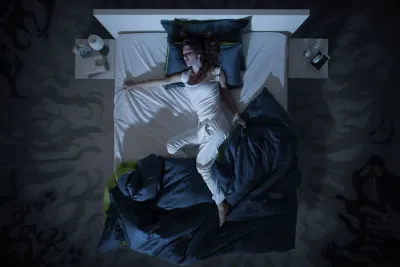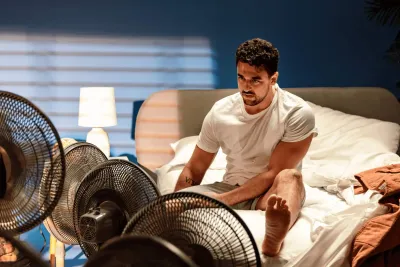
Key Takeaways
You get hot when you sleep because your core temperature must drop to initiate rest. Overheating occurs when external factors like heat-trapping mattresses, warm room temperatures, or heavy bedding—and internal factors like hormonal shifts (menopause/thyroid), stress, or REM-stage brain activity—prevent your body from shedding that excess heat.
- Your body needs to cool down by 1-2ºF to sleep deeply; if it can’t release heat, you wake up.
- Memory foam mattresses and synthetic bedding act as insulators, trapping your body heat against your skin.
- Fluctuations in estrogen (menopause), testosterone, or thyroid hormones can "trick" your internal thermostat.
- During REM sleep, your body’s ability to thermoregulate decreases while brain activity increases, leading to "hot" dreams.
- While fans move air, active cooling technology (like water-based mattress toppers) physically removes heat from the bed for more consistent rest.
Waking up feeling too hot at night is a common issue that can be caused by various factors, such as wearing warm clothes or bedding, experiencing hot flashes, taking certain medications, or having an underlying medical condition.
The human body maintains a consistent temperature during the day, which naturally drops by approximately 1.8 degrees Fahrenheit at night to promote better sleep. However, some still feel uncomfortably hot while sleeping due to their sleep environment, dietary choices, unique body composition, or other medical reasons.
Fact: A sleep study in The Journal of the American Board of Family Medicine found that up to 41% of people experience nighttime overheating. [1 - 2]
Below are some of the most common reasons you might be getting hot at night and how to address them to sleep better at night.
Why Do We Get So Hot When We Sleep?
Imagine your bedroom being too hot or too cold. Yuck! It's no surprise that these extremes can make it challenging to fall asleep.
According to the 2019 review article "The Temperature Dependence of Sleep," mammals coordinate sleep cycles with a decline in core body temperature, suggesting that thermoregulation is fundamental to sleep initiation.
In fact, the article shows the ideal room temperature for sleep is around 66 to 70 degrees Fahrenheit (19 to 21 degrees Celsius) [3].
It turns out that almost 40% of American adults prefer their bedrooms to be set between 66°F and 69°F for sleeping. Maintaining a cool temperature in your bedroom can help improve your sleep quality.
Even if your room temperature is perfect, you might still wake up feeling hot. Why? There are a few sneaky culprits that can make you overheat at night. These include things you do before bed, your pajamas and bedding, and even some health issues and medications.
While the average human body temperature is around 98.6ºF (with some studies considering a normal range between 97ºF and 99ºF), our bodies can actually release a significant amount of heat – up to 100 watts! That's like having a light bulb burning under the covers!
That's why creating a cool and comfortable sleep environment is often overlooked and can help your body regulate its temperature throughout the night, keeping you cooler.

Meet Your Coolest Sleep Solution: Save Up to 20% Off
Sleep hot? Cool it down with a Chilipad cooling mattress topper. Save now and wake up refreshed with temperature-controlled comfort without replacing your mattress. Seamlessly heat or cool your mattress between 55°F and 115°F.
How Does Your Bedroom Environment Cause Nighttime Overheating?
Your environment causes overheating when it creates a "thermal trap" around your body.
Materials like memory foam and synthetic sheets insulate heat, while high ambient humidity prevents sweat from evaporating. This is the body’s primary method of cooling down.
Hot or Humid Climate
As we mentioned above, the best temperature for optimal sleep is between 65 and 68 degrees Fahrenheit: high temperatures and the presence of warm, humid environments. When the air is very humid, sweat can't evaporate effectively, it can interfere with the body's ability to cool down.
Related Blog: Find out if sleeping with a fan on is good or bad for you?
Heavy Bedding
Certain types of sheets and blankets are made to keep you warm by trapping heat. It's best to avoid fabrics like fleece and down that hold body heat, especially during the summer.
Note: Using breathable bedding can help keep your body temperature cooler during the night.
Warm Pillows and Mattresses
Do you ever wake up hot at night, even when your room feels cool? The culprit might be your mattress! Some cozy materials, such as memory foam, can retain and trap heat, causing you to feel warm all night long. This is particularly the case for individuals who have a tendency to sleep hot.
But there's good news! Bed cooling systems can help! Chilipad Dock Pro and Chilipad Cube work with your existing mattress to keep it cool and comfortable all night long.
Thick Sleepwear
Your comfy PJs might be the culprit! Thick fleece or wool pajamas, while undeniably stylish for lounging, can trap heat and make you feel uncomfortably warm all night. This is especially true for people who tend to sleep hot. Opt for lightweight, breathable fabrics like cotton or linen.
Sleeping Partners and Pets
The average adult generates between 75 and 90 watts of heat while sleeping, so sharing a bed with a partner, child, or pet could raise the bed temperature to uncomfortable levels. Can't agree on the thermostat? We've included the best sleep temperature tips for couples.
Hot Sleeper Fact: A 2011 introductory article in the Handbook of Clinical Neurology, 4 out of 5 people report that cool temperature is one of the most important factors in getting a good night's sleep. [4]
Which Foods and Drinks Raise Your Core Temperature Before Bed?
What you eat and drink before bed can surprisingly affect your body temperature at night. Spicy foods, caffeine, and alcohol are the primary dietary triggers for nighttime overheating.
These substances can cause vasodilation or metabolic spikes that prevent your core temperature from dropping the 1-2ºF necessary for deep sleep.
Although there isn't much research on this topic, some studies suggest that certain foods and drinks might raise your body temperature, including;
- Spicy food
- Heavy and protein-rich meals
- Caffeine
- Sugary energy drinks
Related Blog: Wondering if your diet is disrupting your sleep? Explore which foods might be keeping you awake at night and why they matter.
The good news? Sticking with lighter meals, opting for water, and avoiding spicy dishes can help your body regulate elevated body temperature more effectively at night.
This means you get a cooler, comfier spot to drift off to sleep.
How Do Hormonal Shifts From Menopause or Thyroid Issues Impact Sleep?
Hormonal shifts disrupt the hypothalamus, the body’s internal thermostat.
A drop in estrogen during menopause or an excess of thyroxine from an overactive thyroid can cause the brain to misread body temperature, triggering "emergency" cooling responses like hot flashes and drenching night sweats.
A Harvard Health Publishing study in 2022 showed that up to 87% of women experience hot flashes and night sweats during this time. [5]
These intense surges of heat are a direct result of fluctuating hormones, and they can leave you waking up throughout the night drenched and frustrated.
So, how exactly do these hormonal changes increase nighttime heat?
Here's how:
Estrogen
Estrogen decline during perimenopause and menopause can disrupt body temperature regulation, causing hot flashes and night sweats.
Progesterone
Another key hormone, progesterone, also helps regulate body temperature. Its levels decrease during perimenopause and menopause, contributing to feelings of warmth and difficulty staying cool at night.
Thyroid Hormones
The thyroid gland produces hormones that control your body's metabolism, which affects heat production. An underactive thyroid can make you feel cold, while an overactive thyroid can make you feel hot at night and cause sleep disturbances.
Night sweats and hot flashes rank among the most prevalent symptoms of menopause.
The decrease in estrogen and other hormonal shifts, which are not entirely understood, are believed to be the root cause of these symptoms.
Menopause Statistics: According to a 2019 review "Menopausal Hot Flashes: A Concise Review," approximately 80% of women experience hormone-related sweats and hot flashes. [6]
Pregnancy also triggers hormonal changes that result in increased blood circulation and a rise in core body temperature.
Hormonal changes aren't solely a woman's issue. Men can also experience sleep disruptions due to hormonal fluctuations.
Low testosterone levels in men have been linked to night sweats in men and difficulty regulating sleep temperature.
Find simple ways to naturally improve your testosterone levels.

Can Stress and Anxiety Cause Your Body Temperature to Rise at Night?
Yes, stress triggers the "fight-or-flight" response, which increases cortisol and heart rate.
This sympathetic nervous system activity raises your internal core temperature and can cause "psychogenic fevers" or cold sweats, making it difficult for the body to transition into the cool state required for deep sleep.
When stress and anxiety sneak in before bed, they can become unwanted companions that disturb your sleep and leave you feeling restless.
It might sound surprising, but stress can actually make you feel hotter at night. When you're stressed, your body goes through some changes: your blood vessels constrict, which can make your skin feel cooler, but simultaneously, your core body temperature can rise. This internal heat-up might be why you're waking up feeling like a furnace.
And nd you're definitely not alone in feeling stressed. A 2023 Gallup poll found that 49% of Americans reported frequently feeling stressed.
What's more, 77% of adults in the United States experience stress that impacts their physical health, and 73% report it impacting their mental health. [7] So, if you're experiencing nighttime overheating, it's worth considering stress as a potential culprit.
Here's why:
- Fight-or-flight Response: The American Psychological Association highlighted that when stressed or anxious, your body goes into fight-or-flight mode, releasing hormones that prepare you for potential danger. This can lead to increased heart rate, blood pressure, and body temperature, making it difficult to relax and fall asleep. [8]
- Muscle Tension: These tense muscles can produce heat, adding to the feeling of warmth and discomfort when trying to sleep.
- Sleep Cycle Disruption: The stress hormones released during fight-or-flight mode can disrupt your natural sleep cycle and make it harder for your body to regulate its temperature effectively, leading to fluctuations and feelings of being hot.
Try practicing deep breathing exercises, as they can help in managing feelings of anxiety and stress leading up to bedtime.
Did You Know: When you’re feeling anxious or stressed, your body releases cortisol, which increases your heart rate and boosts blood flow, leading to a rise in body temperature.
Why Does Muscle Mass and Body Fat Affect How Hot You Sleep?
Muscle is metabolically active tissue that generates heat even at rest, whereas body fat acts as physical insulation that prevents internal heat from escaping.
People with higher muscle mass often produce more "engine heat," while higher body fat percentages trap that heat under the skin.
A study by Temperature: Multidisciplinary Biomedical Journal suggests that people who weigh more may be more susceptible to heat and may prefer lower temperatures. [9]
What Activities Should You Avoid Before Bed to Stay Cool?
Be aware that certain activities before bedtime, often done unknowingly, can raise your body temperature and hinder your ability to fall asleep.
Understanding these activities can help you make better decisions and enhance your sleep quality.
- Caffeine: Consuming close to bedtime can make it difficult for some, as it can increase core body temperature.
- Exercise: Performing intense exercise right before bedtime can interfere with your sleep. This can lead to elevated heart rate, adrenaline levels, and increase core body temperature, making it harder to fall asleep.
- Intimate Activities: This can improve sleep quality by triggering the release of hormones that encourage relaxation. Vigorous activity that elevates your heart rate can have a similar impact as exercising.
- Stressful Activities: When you're stressed, your blood vessels narrow, which can cause your skin temperature to drop and your core body temperature to rise.
- Spicy Food: Having something to eat or drink before going to bed can play a role in how hot you feel during the night.
- Alcohol: It can raise your core body temperature by affecting your blood vessels and disrupting your body's ability to cool itself.
Which Common Medications List Night Sweats as a Side Effect?
Common medications that trigger nighttime heat include SSRI antidepressants, certain beta-blockers, glucose-lowering drugs for diabetes, and OTC fever reducers.
These drugs can alter the neurotransmitters or metabolic processes that regulate your thermal set-point.
- Migraine medications in the triptan family can cause excessive sweating as a side effect.
- A study published in the British Journal of Haematology found that cortisone, prednisone, and prednisolone may be associated with flushing or night sweats. [10]
- Some antidepressants.
- Certain diabetes medications may increase sweating, primarily if used alongside alcohol, which can be a reason why you get so hot.
- Over-the-counter medicines taken to lower fever (aspirin or acetaminophen) can sometimes cause sweating and affect the body's ability to regulate temperature.
Note: Noticing night sweats after starting a new medication? Talk to your healthcare provider, there may be alternative options or adjustments that can help.
Nightime Fever
Feeling hot during a fever might seem counterintuitive, but it's actually your body's way of fighting off infection. When you're sick, your immune system cranks up the heat, raising your internal temperature set point in the brain. This initial warming might involve shivering or achiness.
Once your body reaches this new, higher temperature, it goes into overdrive, trying to cool you down. Sweating is a key part of this process, as it helps release heat and bring your core temperature closer to normal.
The confusing part is that even though your body is working hard to cool you off, the elevated set point itself makes you feel hot. So, while you might be sweating in a chilly room, the body's adjusted temperature target, not a lack of cooling, is causing the feeling of feverish.
Hyperthyroidism
Hyperthyroidism, a condition where your thyroid gland produces too much hormone, can seriously mess with your body’s thermostat. An overactive thyroid can crank up the heat by speeding up your metabolism, which raises your core temperature.
This internal overdrive often leads to excessive sweating and a persistent feeling of warmth—especially noticeable when you're trying to get some shut-eye.
How Can You Manage Sleeping Hot at Night?
Feeling hot and tossing off the covers all night? You're definitely not alone. Many of us struggle to stay cool while sleeping. But don’t worry—there are plenty of ways to beat the nighttime heat and sleep cooler.
These small changes can make a big difference in how well you rest, from optimizing your sleep environment and managing your diet to staying hydrated, practicing stress relief, and using a cooling mattress topper.
Discover these strategies—plus more smart tips on how to sleep cooler and comfortably all night long. Remember, cooler temperature = more slow wave sleep/deep sleep.
When Should I Be Worried About Sleeping Hot?
Feeling hot or sweaty sometimes during sleep isn't necessarily a cause for concern. Try adjusting your bedtime routine, changing the air conditioning temperature, or making your bedroom cooler. These changes might do the trick!
However, if you frequently wake up sweaty or feel hot throughout the night, it's best to schedule an appointment with your primary doctor. They can help identify any underlying medical conditions that might be causing these symptoms, like chills, fever, weight loss you can't explain, or pain.
Keep a sleep journal for a few nights. Record how often you feel hot in bed and any other symptoms you experience. This information will be like a roadmap for your doctor, helping them pinpoint the cause and recommend the best course of action.
Take Back the Night from Overheating
Waking up hot, sweaty, and restless? You're not alone. Nighttime overheating can throw off your sleep and take a toll on how you feel during the day. The good news? There are real, actionable ways to cool things down.
Factors like hormone shifts, medical conditions, lifestyle habits, diet, and even certain medications can all raise your core temperature while you sleep. If hormones are the culprit, targeted therapies may offer real relief. The key is paying attention to what your body’s telling you—and getting expert support when needed.
With our Chilipad bed cooling systems, you can take control of your sleep environment and help manage the heat. Designed to keep your bed at the perfect temperature, Chilipad gives you the power to sleep cooler, deeper, and more comfortably, night after night.
Don’t settle for sleepless, sweaty nights. We can help you wake up refreshed and ready to take on the day.
"This content is for informational purposes and does not constitute medical advice. Always consult a healthcare professional regarding medical conditions or changes to medication."
Frequently Asked Questions About Sleeping Hot
Why Do I Wake Up Hot at Night?
Waking up hot at night, or sleeping hot, is a common and often uncomfortable experience. Some of the following issues can cause it:
- Warm Room Temperature
- Bedding
- Clothing and Sleepwear
- Medical Conditions
- Lifestyle Factors
- Hormonal Changes
- Medication
How can sleep better if I sweat at night?
- Lower your sleep surface temperature since heat buildup often starts at the mattress, not the room
- Use breathable bedding like cotton or bamboo sheets to reduce heat trapping
- Avoid late night heat triggers such as alcohol, spicy food, and heavy blankets
- Keep your bedroom cool and dark to support natural temperature drops during sleep
- Add active temperature control like a Chilipad to cool or warm your bed directly and stay asleep longer
Why Does My Body Get So Hot at Night?
At night, your body prepares for sleep by cooling down, but after you've been asleep, your core body temperature can rise because your body is working hard to repair and rejuvenate during sleep. This causes your body to create heat, resulting in sleeping hot.
Then there are other factors, which include room temperature, blankets, increased skin temperature, or even certain foods and drinks you ate before bed. All can make you feel hot at night.
How Can I Stop My Body From Overheating at Night?
To stay cool at night, keep your bedroom cool, use breathable bedding, and avoid heavy meals or drinks before bed. Consider using a bed cooling system , (Chilipad Dock Pro or Cube) or opening windows for better ventilation. The cooling mattress topper can absorb your body heat. Take a look at some advantages of sleeping cooler at night.
Why Am I Sweating at Night Even Though my Room is Cold?
While room temperature plays a significant role, other factors can contribute to feeling hot at night. These include bedding materials, pre-bedtime activities, medications, and even certain medical conditions.
Should I Talk to a Doctor if I’m Constantly Overheating at Night?
Absolutely! If you consistently experience nighttime sweats or feel excessively hot throughout the night, it's best to consult your healthcare provider to rule out any underlying medical conditions. Remember to keep a journal, as it can assist your doctor when evaluating your health and understand why you are having trouble sleeping.
Why Does My Body Get So Hot at Night, but Not Sweating?
Your body’s circadian rhythm shifts temperature as you sleep, and sometimes hormones, warm bedding, or heat-trapping mattresses throw things off. Without sweat to cool you down, you’re left overheated. A cooler room, lighter fabrics, or tech like a water-powered mattress can help reset your sleep thermostat.
Can sleeping hot disrupt REM sleep?
Yes. Sleeping hot can interfere with REM sleep. When your body overheats, it has a harder time staying in deeper sleep stages, including REM. Excess heat can cause more wake ups and lighter sleep, reducing the amount of restorative REM sleep you get during the night.
Peer-Reviewed Research References
-
Mold, J.W., Holtzclaw, B.J., McCarthy, L.; Mold, J.W., Mathew, M.K., Belgore, S., DeHaven, M.
Prevalence of Night Sweats in Primary Care Patients.
Journal of the American Board of Family Medicine (2012); Journal of Family Practice (2002).
Study Type: Primary Care Observational Studies
Key Finding: Both studies found night sweats to be a common complaint in primary care populations, frequently associated with stress, mood disorders, medications, and hormonal changes rather than serious underlying disease.
View Study (2012)
Source URL: https://www.jabfm.org/content/25/6/878
-
Harding, E.C., Franks, N.P., Wisden, W.
The Temperature Dependence of Sleep.
Frontiers in Neuroscience, 2019.
Study Type: Neuroscience Review
Key Finding: Demonstrates that sleep onset and maintenance are highly sensitive to ambient and skin temperature, with cooling playing a key role in stabilizing sleep states.
View Study
Source URL: https://pubmed.ncbi.nlm.nih.gov/31105512/
-
Aminoff, M.J., Boller, F., Swaab, D.F.
Handbook of Clinical Neurology, Vol. 98. 2011.
Source Type: Medical Textbook Summary
Key Insight: Notes that humans spend roughly one-third of life asleep, underscoring sleep’s foundational role in neurological and physical health.
View Book
Source URL: https://pubmed.ncbi.nlm.nih.gov/21056174/
-
Harvard Health Publishing.
Perimenopause: Rocky Road to Menopause.
Harvard Health, 2022.
Source Type: Medically Reviewed Health Resource
Key Insight: Explains how hormonal fluctuations during perimenopause commonly trigger night sweats, hot flashes, and fragmented sleep.
View Resource
Source URL: https://www.health.harvard.edu/womens-health/perimenopause-rocky-road-to-menopause
-
Bansal, R., Aggarwal, N.
Menopausal Hot Flashes: A Concise Review.
Journal of Mid-Life Health, 2019.
Study Type: Clinical Review
Key Finding: Reviews the thermoregulatory mechanisms behind hot flashes and night sweats during menopause.
View Study
Source URL: https://pubmed.ncbi.nlm.nih.gov/31105588/
-
McLean Hospital.
Stress: What You Need to Know.
Source Type: Clinical Mental Health Resource
Key Insight: Describes how chronic stress elevates cortisol and sympathetic nervous system activity, increasing nighttime sweating and sleep disruption.
View Resource
Source URL: https://deconstructingstigma.org/guides/stress
-
American Psychological Association.
Stress in America: A National Health Crisis. 2020.
Source Type: National Survey Report
Key Insight: Reports widespread chronic stress among U.S. adults, strongly linked to poor sleep quality and frequent nighttime awakenings.
View Report
Source URL: https://www.apa.org/news/press/releases/stress/2020/report-october
-
Schweiker, M., et al.
Drivers of Diversity in Human Thermal Perception.
Temperature, 2018.
Study Type: Scientific Review
Key Finding: Explains why thermal comfort varies widely between individuals, reinforcing the need for personalized sleep temperature solutions.
View Study
Source URL: https://pubmed.ncbi.nlm.nih.gov/30574525/
-
Roberts, L.N., et al.
Late-Onset Hypogonadism: An Alternate Cause for Night Sweats.
British Journal of Haematology, 2009.
Study Type: Clinical Case Study
Key Finding: Identifies testosterone deficiency as a potential underlying cause of night sweats in men, highlighting endocrine health as a sleep factor.
View Study
Source URL: https://pubmed.ncbi.nlm.nih.gov/19222468/









